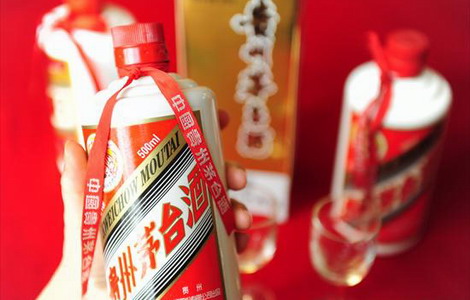
|
 |
|
The starting price for a bottle of Moutai liquor at a recent auction was 380,000 yuan ($60,000). [Photo / China Daily]? |
As foreign luxury brands compete to carve out portions of China's fast-growing market, experts are predicting that Chinese companies will soon develop luxury brands of their own.
It is time for domestic enterprises to establish luxury brands, since China has already become the dominant driver of growth in the luxury sector, said Zhou Ting, executive director of the research center for luxury goods and services at the University of International Business and Economics.
The sales volume of China's luxury market was 11.5 billion euros ($15 billion) in 2011, a year-on-year growth of 25 percent, according to PricewaterhouseCoopers International Ltd.
Potential domestic luxury brands could come from some traditional Chinese industries, including liquor, tea, porcelain and silk, said Yang Qingshan, a guest researcher of luxury goods and services at UIBE.
The research center listed 10 domestic brands with the potential to become luxury brands in its luxury report in November. Three liquor brands - Moutai, Wuliangye and Langjiu - are among the 10 brands. Zhuyeqing tea and some clothing brands, such as NE-Tiger and Shanghai Tang, are also on the list.
"Many traditional Chinese products already have a feature of luxury because of their heritage," Yang said.
However, many Chinese enterprises do not want to become luxury brands, since luxury is not a positive word in Chinese culture, as frugality is advocated, Yang said. "Chinese enterprises are usually conservative."
For example, the starting price for a bottle of Moutai liquor at a recent auction was 380,000 yuan ($60,000). But Ji Keliang, honorary chairman of China Kweichow Moutai Distiller Co Ltd, said that the company opposes labeling its liquor as a luxury product, Jiefang Daily Newspaper reported in November.
However, some Chinese enterprises have begun to change their attitudes toward luxury and intend to develop high-end brands.
Luzhou Laojiao Co Ltd, which operates the longest-running liquor cellar in China, released high-end bottles priced at 336,666 yuan each on March 16."Our liquor has two necessary features of luxury items, which are scarcity and heritage," said Zhang Liang, president of the company, according to the Beijing Times on March 17.
Zhang Zhifeng, chairman of NE-Tiger Fur Fashion Co Ltd, is also working on establishing a luxury-clothing brand."I aim to develop my company into one of the top international luxury brands," Zhang said.
Zhang intended to establish a luxury brand when he registered NE-Tiger in 1992, but some consumers said the company's reputation is still far from that of international luxury brands.
Creating a luxury brand is no small task, according to the UIBE researchers."It takes at least 30 years to develop a luxury brand," said Yang.
Merger and acquisition are faster methods of producing luxury brands, Yang said. Shanghai Tang became the first successful Chinese luxury-clothing brand after it was purchased in 2000 by Richemont Group, the world's second-largest luxury conglomerate by turnover. The transaction instantly promoted Shanghai Tang into an international luxury brand.
Meanwhile, Chinese investors are also trying to enter the international luxury market thorough investment and acquisition.
"Purchasing a luxury brand is a shortcut for Chinese enterprises by instantly acquiring a brand's heritage, which can span hundreds of years," Yang said.
As some companies in the West struggle amid the recent economic recession, it provides Chinese enterprises with ripe acquisition opportunities. But acquisition is not the best way for Chinese enterprises to enter the luxury market, experts say, since the acquired brands are still foreign and lack Chinese elements.
Although Chinese manufacturers still have a long way to go in the luxury industry, supported by a huge consumer base and rising incomes, Chinese luxury brands will soon emerge, said UIBE expert Zhou Ting.
Marketing is an important tool, which Chinese companies must learn from international luxury brands, Zhou added.
International luxury brands excel at telling their stories and connecting their brands with history, Zhou said.
"Chinese companies only make products, and none of them link their products to culture," said Xia Yang, president of Beijing Sunny Times Polo Sports Co Ltd.
Xia said Hermes can charge thousands of yuan for a scarf because the brand has historical value. Consumers buy not only its product but also its history and culture, he added.